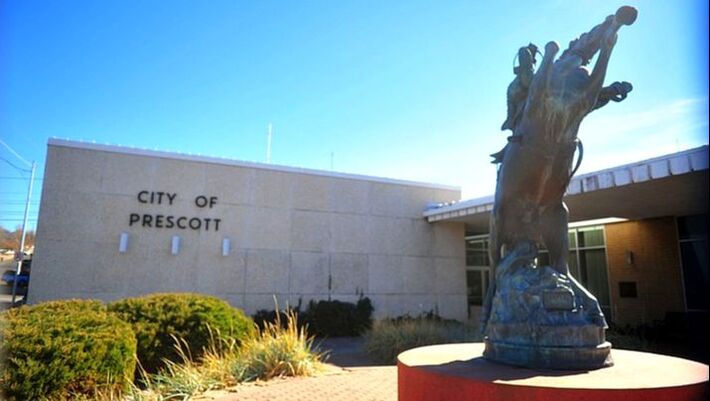
by Corinne Murdock | Dec 20, 2023 | News
By Corinne Murdock |
On Tuesday the legal team for former GOP gubernatorial candidate, now Senate candidate, Kari Lake argued for the dismissal of Maricopa County Recorder Stephen Richer’s defamation lawsuit against her.
Richer filed his defamation lawsuit against Lake in June over her claims of his administration of the 2022 election. Lake filed a motion to dismiss in August.
In his amended complaint, Richer alleged that Lake had “falsely and with actual malice” accused him of intentionally printing improperly-sized ballots and inserting 300,000 illegal or invalid early-vote ballots during his administration of the 2022 general election. Richer said that the accusations have caused him and his family real harm, including threats of violence and death.
Lake’s motion to dismiss argued that she voiced legitimate concerns about the 2022 election, and that Richer’s lawsuit amounted to retaliation following two failed attempts at obtaining sanctions against her. In those denied requests for sanctions, Maricopa County Superior Court found that Lake’s claims weren’t groundless or brought forth in bad faith.
“The types of statements that Recorder Richer complains of are the types of statements directly related to his job performance that political foes and constituents critical of elected officials ordinarily make,” read the motion.
During Tuesday’s arguments in the Maricopa County Superior Court, one of Richer’s attorneys, Cameron Kistler, said that Lake’s speech wasn’t hyperbole, but a statement of facts.
“She’s making statements where she’s asserting these are actual facts that happened in the world, these are actual accusations of falsifiable criminal conduct,” said Kistler.
Jen Wright, the former assistant attorney general serving on Lake’s team, countered that Lake did believe her speech to be true based on the facts at hand: the county’s admission that there were ballots that lacked chain of custody, and that printer problems did occur for some, still unknown reason.
“I don’t think it’s a question of fact as to whether or not the printers malfunctioned, it’s a question of opinion as to how they characterized them,” said Wright.
Richer accused Lake of issuing dozens of defamatory statements.
Jessica Banks-McDowell, an Arizona State University (ASU) law student on Lake’s team, said that court precedent clarifies that Richer’s intent via his filings is to stifle Lake’s speech. ASU’s First Amendment Clinic signed onto Lake’s defense.
“There is very clear intent of his motivation to deter, retaliate against, or prevent Kari Lake’s lawful speech,” said Banks-McDowell.
Richer seeks an injunction that would force Lake to delete the allegedly defamatory statements.
Banks-McDowell further argued that Richer hadn’t met the burden of proving defamation occurred as required by A.R.S. 12-751, Arizona’s anti-SLAPP (Strategic Lawsuit Against Public Participation) law.
Kistler said that the anti-SLAPP law didn’t apply here because Lake’s team didn’t provide evidence to prove Lake’s disputed statements as true.
Corinne Murdock is a reporter for AZ Free News. Follow her latest on Twitter, or email tips to corinne@azfreenews.com.

by Daniel Stefanski | Dec 20, 2023 | News
By Daniel Stefanski |
A northern Arizona city is showing its support for the nation of Israel.
Earlier this month, the Prescott City Council passed a resolution to condemn Hamas and declare support for the Jewish State of Israel.
The motion to pass the resolution, taken during the City Council’s voting meeting on December 12, was unanimously adopted 7-0. After the result was announced, those in attendance, as well as some of the members behind the dais, broke into applause.
Prescott Mayor Phil Goode, who ushered the resolution through the meeting, said, “I’m quite proud of this council and our adoption of this resolution. As I said, I hope there are other cities and towns in this state that will follow our lead.”
In the resolution, Prescott leaders highlighted the state’s adoption of “the International Holocaust Remembrance Alliance’s definition of antisemitism which includes anti-Zionism.”
The resolution gave seven action items for the city to follow in its support of Israel, which were as follows:
- Reaffirm its support and unwavering commitment to the welfare, security, and survival of the Jewish State of Israel;
- Recognize Israel’s right to act decisively and unilaterally in self-defense to protect is citizens;
- Express its support for Israel’s right to pursue without interference or condemnation the elimination of Hamas;
- Convey its most heartfelt condolences to all Israeli victims as well as their families and communities;
- Call upon Prescott law enforcement to remain vigilant in protecting Israeli Americans, Jewish Americans and all supporters of Israel from acts of crime and unlawful discrimination that tend to manifest at such times;
- Encourage all other Americans to likewise condemn Hamas as well as any official body that refuses to recognize Israel’s right to act decisively in self-dense to protect its citizens; and
- Call upon the United States to provide all assistance as may be required to support Israel in its defense against Hamas and all other terrorist organizations.
The Prescott City Council’s strong demonstration of support for Israel follows a similar action taken by the Arizona State Legislature on October 11, when Senate President Warren Petersen and House Speaker Ben Toma issued a Joint Legislative Proclamation to “denounce the horrific acts of war against Israel and support Israel’s right to defend itself” – among other calls to action for the Legislature.
Daniel Stefanski is a reporter for AZ Free News. You can send him news tips using this link.

by Daniel Stefanski | Dec 19, 2023 | News
By Daniel Stefanski |
Another week brought another near-record number of apprehensions in the Tucson Sector of the southern border.
Late last week, John Modlin, the Chief Patrol Agent of the U.S. Border Patrol’s Tucson Sector, announced that his agents had encountered 18,400 illegal aliens over the past seven days. The new number from Chief Modlin clocked in at just 500 fewer migrants than the previous week, which was regarded as historic for the sector.
The revelation from Chief Modlin came just one day following Governor Katie Hobbs’ announcement that she was mobilizing members of Arizona’s National Guard to the border near Lukeville. Hobbs made sure to point fingers at the federal government in her news alert, saying, “The crisis at the border is unacceptable. We need the federal government to step up, do its job, and bring security and stability to the border. I will continue to work with anyone who can help us bring an end to this mess.”
Ali Bradley, a National Correspondent for NewsNation, shared a prediction that largely due to the record-number of apprehensions occurring in the Tucson sector, the total arrests for December across the entire southern border “is on track to blow November encounter numbers out of the water.”
In the Arizona Senate Republicans’ latest Week in Review, Senate President Warren Petersen addressed the crisis at the border, saying, “Every week, we continue to have human smugglers, murders, rapists, drug dealers, child sex traffickers, and terrorists entering our state, as record-breaking numbers of illegals cross our border. Biden has sent a message to the entire world that our southern border is wide open, and this is the consequence. Meanwhile, the closure of the Lukeville Port of Entry continues to impact trade, tourism, and the daily lives of Arizonans who live in these rural parts of the state. We need resources and funding sent to the border now, and we call on President Biden to act immediately. The U.S. Supreme Court has made it clear that the border is the responsibility of the Federal Government, therefore our hands are tied in many areas when it comes to the border.”
Petersen also highlighted an area where the legislature and governor could take action together to help mitigate the crisis, writing, “But, if the Federal Government isn’t going to step up or enforce existing law, then we need a law allowing states to enforce immigration policy and deport those entering Arizona illegally.”
Despite Hobbs’ efforts to be perceived as taking the border crisis seriously, she is unlikely to work with Petersen and his Republican colleagues on such a proposed law.
Daniel Stefanski is a reporter for AZ Free News. You can send him news tips using this link.

by Corinne Murdock | Dec 19, 2023 | News
By Corinne Murdock |
State Rep. Alex Kolodin (R-LD03) and Allyson Miller, former Pima County supervisor, filed a bar complaint against the Cochise County attorney, Brian McIntyre, on Monday.
Kolodin and Miller accused McIntyre of violating Rule 1.6, attorney-client privilege, for revealing privileged advice given to the Cochise County Board of Supervisors in connection with handling the 2022 election results.
The board considered a post-election hand count audit last year; during a public meeting, McIntyre revealed that he’d advised the board against the audit. Kolodin and Miller said the revelation amounted to a violation of attorney-client privilege.
Following the lawsuit against the supervisors — his clients — over the audit, McIntyre also sent a letter to their counsel disclosing a list of laws he believed the supervisors potentially violated. Kolodin and Miller asserted that McIntyre’s letter was unnecessary, crafted in a way to provide legal analysis, and used by the media to the detriment of the supervisors.
For these actions, the pair also accused McIntyre of violating Rules 1.1, requiring competent representation of a client; 1.7, 1.8, and 1.9, prohibiting conflict of interest; and 3.8(f), requiring behavior to promote public confidence in the integrity and impartiality of the legal system.
“It is time for equal justice under law,” posted Kolodin on X.
The complaint comes shortly after the bar put Kolodin on 18 months of probation for representing those challenging the 2020 election results. The State Grand Jury indicted Cochise County Supervisors Peggy Judd and Tom Crosby last month over the 2022 audit controversy, which resulted in a delay of the statewide canvass.
Kolodin says he filed the complaint in order to ensure the equal application of ethical standards, regardless of political alignment.
In a statement to AZ Free News, Kolodin said that McIntyre’s actions were deserving of scrutiny and, if applicable, discipline.
“Equal justice under law is a foundational legal principle,” said Kolodin. “Regardless of the policy preferences we advocate for, the law must be fairly and neutrally applied.”
Miller told AZ Free News that McIntyre should’ve done better to protect the supervisors by handling privileged legal information through an executive session. Miller opined that McIntyre abandoned the supervisors.
“He doesn’t have a right to be a judge,” said Miller.
The former supervisor also asserted that Judd and Crosby abided by the statutory deadline on canvassing, since they certified on Dec. 1 and state law imposes a deadline of the fourth Monday following the general election — or, Dec. 5 — for certification. The statute also allows for the canvass to be postponed “from day to day” for up to 30 days from Election Day until all counties submit their canvasses.
“If the official canvass of any county has not been received on the fourth Monday following the general election, the canvass shall be postponed from day to day, not to exceed thirty days from the date of the election, until canvasses from all counties are received,” reads A.R.S. 16-648(c).
Miller said she felt every official in the state should sign onto their complaint, surmising that McIntyre’s actions set a dangerous precedent for counsel to undermine officials based on political reasons.
“You have a right to be represented in the discharge of your duty,” said Miller.
Kolodin and Miller’s bar complaint prompted a flurry of online commentary from Rep. Paul Gosar (R-AZ-09), who applauded the bar complaint against McIntyre. Gosar pointed out that no Democrat-aligned lawyers were sanctioned under 2000 or 2016 election challenges.
Gosar portrayed Kolodin as one of a class of lawyers punished for representing causes and individuals “disfavored by the regime,” a hallmark of autocracy according to the congressman.
“This form of oppression is well documented by autocrats desperate [to] stop any challenge [to] their legitimacy,” said Kolodin.
State Sen. Wendy Rogers (R-LD07) characterized the bar complaint as an effort to fight back against a disparate system of justice.
“The sword cuts both ways,” said Rogers. “Not taking it lying down anymore.”
Corinne Murdock is a reporter for AZ Free News. Follow her latest on Twitter, or email tips to corinne@azfreenews.com.

by Corinne Murdock | Dec 19, 2023 | Education, News
By Corinne Murdock |
Arizona State University’s (ASU) former information technology (IT) manager was indicted for embezzling over $124,000 from the institution over the course of over four years.
According to the auditor general, ASU leadership was partially at fault for the embezzlement.
Carlos Urrea, ASU’s former University Technology Officer (UTO) manager, allegedly embezzled the money through unauthorized personal purchases using his ASU purchase card. (The UTO is now the Enterprise Technology Office). ASU reported their findings on Urrea to the auditor general for further investigation.
In a report published last Friday, the auditor general found that Urrea used his purchase card to make over 800 personal purchases amounting to over $124,000. Urrea then attempted to conceal the purchases using over 700 forged receipts and falsified the business purpose descriptions to make them appear as if they were for valid ASU purposes.
According to the auditor general report, an ASU audit in December 2021 revealed discrepancies between Urrea’s receipts and the issuing bank’s line-item details of the purchases. Urrea reportedly refused to comply repeatedly with further auditory efforts by the university. At the time, ASU found over $95,000 of unauthorized personal purchases made by Urrea.
Upon further investigation by the auditor general, the amount Urrea allegedly embezzled grew by over $28,000.
Among those unauthorized purchases were gift cards, including $11,000 in Costco Shop cards; electronics and accessories, including 10 smart watches; household items and furniture, including two Christmas trees; appliances, including a washer and dryer; gaming products, including 12 gaming consoles; fitness and recreation items, including a treadmill and a rowing machine; and warranties.
The auditor general reported that Urrea admitted to using the ASU purchase card for personal purchases. Urrea told the auditor general team that he used ASU’s Adobe Acrobat Editor software to alter his personal purchase receipts in PDF format.
Urrea also reportedly called his actions “very dumb,” and characterized the purchases as his means of providing for his family.
According to the State Press salary database for ASU, Urrea made $45,000 in 2016, $75,000 in 2017, $77,250 in 2018, $92,700 in 2019, $100,116 in 2020, and $106,000 in 2021.
According to the auditor general, ASU revealed that its executive administration officials allowed Urrea to bypass appropriate university policies and procedures for purchase cards so that Urrea could either provide immediate IT-related equipment or maintain his support for senior leadership. As a result, Urrea was exempted from engaging in the procurement process, obtaining prior purchase approval, submitting detailed business purpose descriptions for purchases, submitting receipts on time, and bypassing restricted spending protocols when receipts were submitted late.
“Mr. Urrea was able to make and conceal his personal p-card purchases because management allowed him to: use his p-card instead of procurement process on the pretext of providing immediate support to senior leadership, make p-card purchases without seeking prior approval, submit vague business purposes, [and] submit p-card receipts 2-3 months late without restricting his p-card spending to $1 in accordance with policy,” stated the report.
The auditor general noted that ASU modified its purchase card policy by requiring executive administration adherence where possible, or requiring the business team — not individuals — to make purchases where not possible.
The Maricopa County Attorney’s Office passed on the auditor general’s findings to the Maricopa County Superior Court Grand Jury. The latter indicted Urrea on 14 felony counts of theft, misuse of public monies, fraudulent schemes, and forgery.
Corinne Murdock is a reporter for AZ Free News. Follow her latest on Twitter, or email tips to corinne@azfreenews.com.

by Daniel Stefanski | Dec 18, 2023 | News
By Daniel Stefanski |
With the start of the 2024 Arizona legislative session just weeks away, Republicans took time this week to roll out their agenda for the upcoming months in a divided state government.
The plan, released by the Arizona State Senate Republican Caucus on Thursday, featured eleven categories for 2024 – budget approach, inflation relief, law enforcement & military, education, water, infrastructure, health, government, judiciary, elections, and litigation. The caucus looked back at the year that was in 2023, writing, “Senate Republicans unified in the face of divided government, passed a fiscally conservative and responsible budget historically early in the legislative session, provided inflation relief, funded critical infrastructure projects, protected school choice, and served as a check on executive and federal overreach.”
Senate Republicans also previewed their efforts for the next legislative session in the plan, stating that they would “remain laser focused on easing the burden of rising costs for our citizens, while continuing to stop dangerous California-style policies from being implemented in the Grand Canyon State.” They added that they would “remain unified in protecting freedoms and constitutional rights, advocating for family values and safe communities, promoting free market principles and limited government, and stopping radical ideologies from infiltrating the way of life and opportunities we’ve established over the past decade for all Arizonans.”
‘Unified’ was definitely a key theme Senate Republicans wanted readers to take away from their plan for 2024, as it was central to a successful 2023 despite razor-thin majorities in both legislative chambers and a Democrat in the Governor’s Office. Republicans in both the Arizona House and Senate were highly disciplined on a number of fronts throughout the 2023 legislative session, staying unified on almost every issue while relentlessly fighting for conservative principles. Because of their cohesive strategies, Republicans were able to gain major victories and concessions from Governor Katie Hobbs when it mattered most, as well as to win points with the general public for their work.
2024 promises to be a more challenging year for legislative Republicans. Hobbs will be starting her second year on the job and has a new chief of staff who is respected by many on both sides of the aisle. Hobbs will also be looking for more wins to showcase for her base in what will certainly be a volatile election year on all levels. The governor was soundly criticized by many in her party for, what appeared to be, a capitulation to Republicans over the most-recent budget compromise – especially when it came to Arizona’s historic school choice program. Hobbs spent the rest of the year taking critical and damaging aim at ESAs.
Senate President Pro Tempore T.J. Shope cheered on the plan, saying, “Honored to be a part of the Arizona Senate Republicans family! We will work hard to deliver for the hard working people of Arizona!”
Senator Anthony Kern shared similar sentiments: “Republicans have your back, Arizona, and will ensure State 48 ‘NEVER’ looks like Democrat controlled California!!”
Daniel Stefanski is a reporter for AZ Free News. You can send him news tips using this link.






